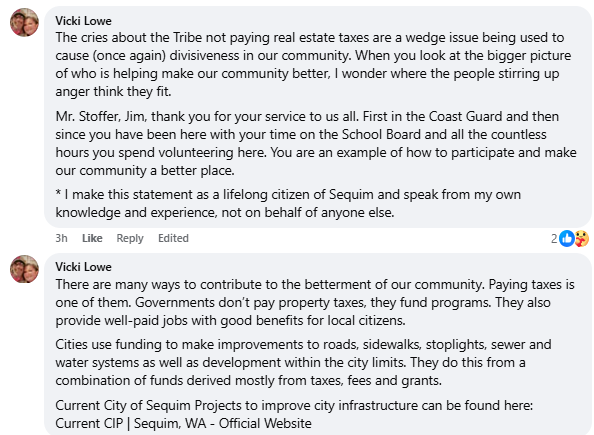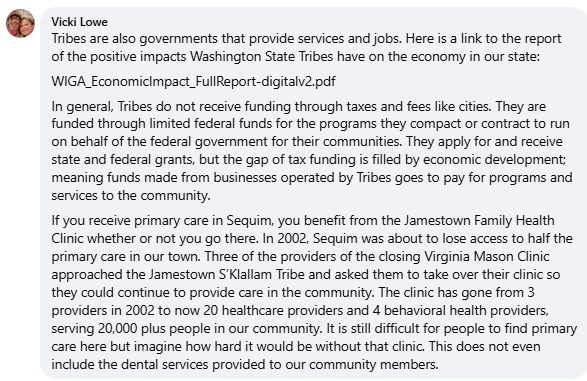Two views on tribal contributions
Sequim City Councilmember defends Tribe amid tax debate
The Jamestown S’Klallam Tribe’s growing economic role is drawing scrutiny. Are its tax-exempt businesses a model of self-reliance—or enjoying public benefits without public obligations? The debate pits sovereignty against calls for civic accountability.
In a recent social media exchange, Jamestown S’Klallam Tribal citizen and Sequim City Council member Vicki Lowe pushed back on criticism aimed at the tribe’s tax-exempt status and its growing influence in local civic and economic life. The exchange highlights a simmering debate over whether the Tribe—while officially recognized as a sovereign government—is functioning more like a powerful corporate entity, benefiting from public infrastructure while avoiding certain civic obligations.
Critics argue that the tribe’s many businesses, such as the 7 Cedars Resort and Jamestown Family Health Clinic, operate on a playing field tilted by exemptions from property taxes and regulatory oversight. They point out that these operations benefit from roads, utilities, and other infrastructure largely funded by city and county taxpayers—while the tribe, as a sovereign government, is not required to contribute to those systems in the same way by dodging taxes and regulations.
Lowe, however, offered a different perspective. “Tribes are also governments that provide services and jobs,” she wrote in a detailed comment, emphasizing that tribal governments do not fund their programs through property taxes, but through a mix of federal grants and economic development. “The gap of tax funding is filled by economic development,” she explained, positioning the tribe’s enterprises as vital service providers and job creators.
A key example cited by Lowe is the Jamestown Family Health Clinic, which she says stepped in when other providers left the community. “In 2002, Sequim was about to lose access to half the primary care in our town,” she noted, referencing the closure of the Virginia Mason Clinic. The Jamestown Tribe assumed operations and expanded the clinic, which now employs more than 20 healthcare and behavioral health providers and serves over 20,000 people in the region.
This intervention is undeniably significant—but it also raises questions about structure and accountability. Unlike public hospitals or city-run utilities, which reinvest surplus revenues into services, tribal businesses may transfer profits to the Jamestown Corporation or other arms of the tribal government, without public disclosure. As sovereign entities, tribal governments are not subject to the same transparency standards as cities or counties, and their internal finances are often shielded from public view.
That lack of transparency fuels concern among some residents and local officials who feel that economic power should be matched by civic accountability. With Clallam County and its municipalities facing mounting infrastructure needs and constrained budgets, the issue of who pays—and who doesn’t—has taken on new urgency.
Lowe dismissed these criticisms as divisive, suggesting they distract from the tribe’s substantial contributions. “There are many ways to contribute to the betterment of our community. Paying taxes is one of them,” she wrote. “Governments don’t pay property taxes; they fund programs. They also provide well-paid jobs with good benefits for local citizens.”
But the debate is not merely about services or sentiment—it’s about systems. In most communities, tax revenue pays for sidewalks, sewers, and public safety. When an entity like the Jamestown S’Klallam Tribe expands its footprint in commerce and real estate while operating outside the tax structure, some see it as an imbalance. Others, like Lowe, see it as a valid expression of tribal sovereignty and self-reliance.
The issue, then, may not be whether the tribe contributes—it clearly does—but whether the current framework ensures a level playing field. Without mechanisms for transparency or shared financial responsibility, critics argue, tribal operations benefit from public systems while remaining insulated from the obligations those systems demand.
As former School Board member Jim Stoffer responded in the same thread, “Thank you Jamestown S’Klallam Peoples, one community working together for all.” The sentiment is generous, but the underlying question remains: can a community truly work together when not everyone is subject to the same rules?







I have zero interest in talking politics with someone who publicly and on paper denounces the Point No Point Treaty of 1855. Councilmember Lowe has not properly tracked all the money siphoned to the tribes through traditional non-tribal sources and agencies. The BIA obviously does not provide them all the funds they get now. The U. S Department of Commerce has long funded the tribes. That will most likely stop. County tax payers paid 1 million to match that grant. They paid 5 million for the re-compete grant. No Viki Lowe will not tell the real story about how the tribe ,county and cities joined an international charter to re-negotiate a treaty without authority from Congress, to bogart our local economy. Apparently something they all feel righteous about since we are such terrible colonizers. But they always hoped they could hide everything over at SERN and NODC. That did not happen it all got out. Now they have to own up to the treaty malfeasance the last 14 years.
As Vicki Lowe stated the tribes fund their projects "through a mix of federal grants and economic development". Federal grants ? So the citizen tax payer pays for grants to the tribes and then pays more taxes to cover the taxes the tribes do not pay. Fairness, equity, equality and equal are noticeably absent from that scenario. Jim Stoffer has it spot on with "can a community truly work together when not everyone is subject to the same rules?" The indigenous peoples who were wrongly treated and their abusers NO LONGER LIVE. Entertaining special and unique ancestry rights above all others is not compatible with equality. If USA tribes seek sovereignty, they must be treated the same as all other sovereign nations. It is the BOTH AND that is not working. Become friends and neighbors; not friends and neighbors with rights and privileges above all other occupants of this land.